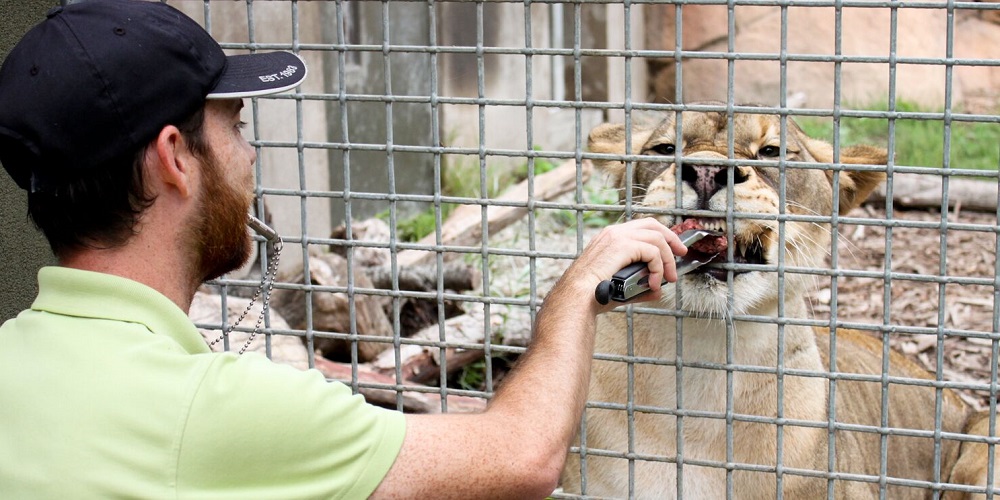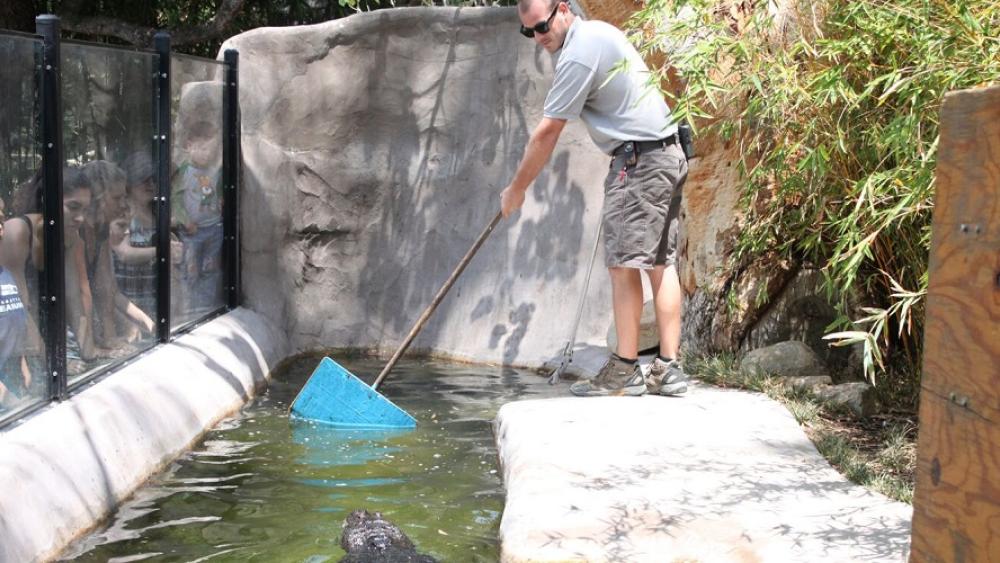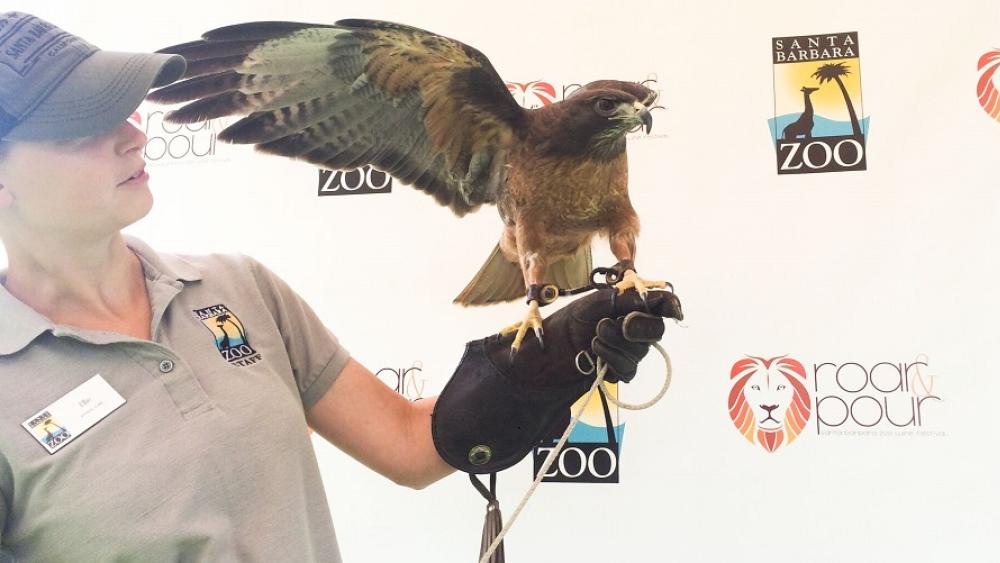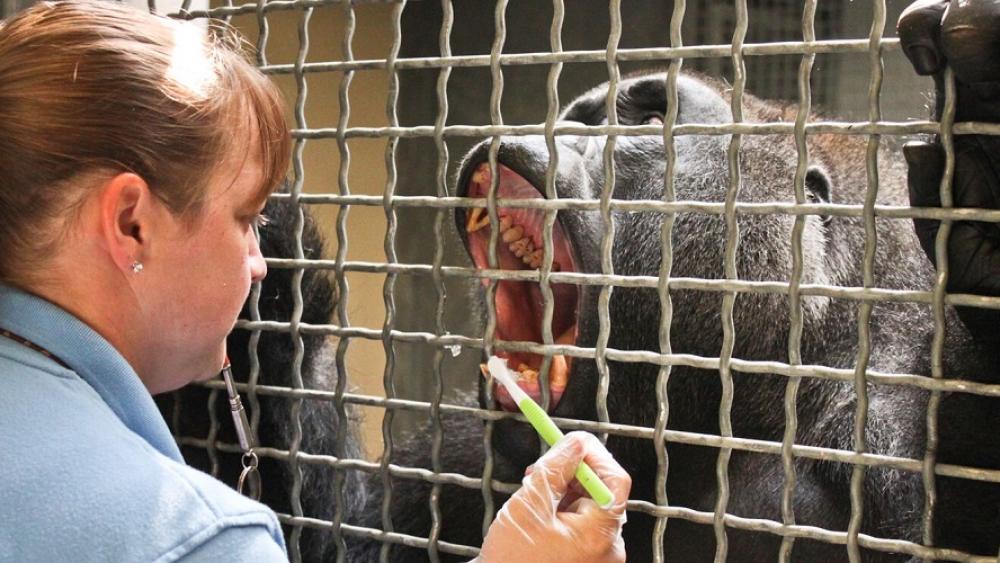Are You Interested in Becoming a Zookeeper?

Finding the right career path post-graduation can be challenging. If you haven't checked out the Internship and Career Center website yet, you should! The ICC has a lot of helpful information for people at any stage in their job search. Animal science majors from UC Davis have entered careers as agricultural and natural resources consultants, agricultural and pharmaceutical sales staff, fisheries owners, lawyers, physicians, researchers, teachers, veterinarians and zookeepers.
Zookeepers are responsible for the care and management of wild animals in captivity. They are in charge of maintaining and enriching habitats, and are involved in diet preparation. They may assist veterinarians in medical procedures, and watch to identify any illness or injury of the animals they oversee. Zookeepers may be involved in outreach to the public, providing information about the animals at their zoos for conservation purposes.
To help you explore further options, we here at the Animal Science Advising Center will be taking a closer look at popular careers in the animal science field. Below please explore opportunities related to becoming a Zookeeper.
Exotic Internship Opportunities
There are many wonderful exotic animal experiences available to UC Davis students on campus, in the wider Sacramento area, and abroad! Check out all of the different ways to explore this exciting career path.
UC Davis California Raptor Center
Located just south of the UC Davis campus along Old Davis Road, the California Raptor Center works tirelessly to rehabilitate and save the lives of California's native birds of prey. No prior experience is necessary- all volunteers will be trained.
How to Get Involved: Volunteer applications are available at the beginning of the quarter upon request.
Rehabilitation Office: 530-752-6091
Meyer Hall Hatchery
The Meyer Hall Hatchery is located on the lower-level of Meyer Hall, and houses tropical birds species used in research. Students can get experience in the hatchery either in ANS 49K, or by interning.
How to Get Involved: Contact Kristy Portillo (knsmith@ucdavis.edu) about internship opportunities, or register for a section of ANS 49K in the Fall Quarter.
Bodega Marine Laboratory
Classes taught at Bodega Bay count towards an aquaculture specialization in Animal Science. Students spend a quarter living on site, studying marine and coastal ecosystems. Courses are also available in the summertime.
How to get involved: Sign up for Spring or Summer Programs.
Wild Campus
Wild Naturalist student volunteers work as a group to create multi-year conservation plans for local Davis wildlife. Volunteers are also responsible for public outreach events.
How to Get Involved: Check out the Wild Campus volunteer page.
Museum of Wildlife and Fish Biology
Located in the Academic Surge on campus the Museum of Wildlife and Fish Biology houses a large collection of local specimens. Interns are involved in specimen preparation, curatorial work, and science based outreach and education.
How to Get Involved: Visit the Volunteer and Internship Opportunities and Outreach pages.
Contact Irene Engilis at ieengilis@ucdavis.edu
Sacramento Zoo Internship
The Sacramento Zoo internship offers volunteer experience year round for students. Keeper Aides shadow full time zookeepers throughout their daily husbandry rounds.
How to Get Involved: Visit the Volunteers page on Sacramento Zoo's website.
Contact: 916-808-7444
Are you interested in receiving academic credit for your internship experience? Be sure to meet with your ASAC advisor to learn more about internship credit, and check out our Online Internship System page to apply for internship units now!
Exotic Study Abroad Opportunities
Are you interested in getting more hands-on exotic animal experience? Studying abroad might be a great option for you! Visit Study Abroad's website, or stop by their office! You may also make an appointment to discuss study abroad with a Peer or Staff Advisor in the Animal Science Advising Center email us at asac@ucdavis.edu. Our hours are Monday-Friday 9AM-12PM and 1PM-4PM.
African Conservation Experience (ACE)
ACE is a program with dedicated zoologists, biologists and conservationists who strive to protect African wildlife. Students are able to shadow veterinary staff year round working in large game reserves. They offer a wide variety of different experiences including: Wildlife Research and Management, Wildlife Care and Rehabilitation, Wildlife Veterinary Experience and Marine Conservation.
How to Get Involved: Visit the African Conservation Experience website.
EDventure
EDventure is devoted to providing students with educational oportunities that positively impact the environment and positively impacting socioeconomic situation of the human inhabitants living in the areas they have programs. You might be particularly interested in their Costa Rica Turtle Conservation program.
How to Get Involved: Visit their Destinations page.
Apply to EDventure.
International Student Volunteers (ISV)
Ranked among the top 10 volunteer service organizations, ISV allows students to experience either eco-tourism and service trips in 2-4 week incremints abroad. Programs involving wildlife rehabilitation are located in Thailand, South Africa and Costa Rica. There are other countries that have ISV programs, but do not deal directly with animals like: Austrailia, the Dominican Republic and New Zealand.
How to Get Involved: Visit the International Student Volunteer website.
Study Abroad Through UCEAP
The University of California Education Abroad Program (UCEAP) offers many exciting opportunities to take coursework overseas. Popular programs for those interested in wildlife include Australia -Urban to Outback, Marine Biology and Terrestrial Ecology in Australia and Tropical Biology and Conservation in Costa Rica.
How to Get Involved: Visit the UCEAP website.
Wildlands Studies International Environmental Field Programs
Spend a quarter immersed in wildlife research in the United States or abroad. Small teams of students work alongside professional biologists in their area of interest. Trips may count for 6-18 quarter units of credit.
How to Get Involved: Visit the Wildlands Studies website, or check out one of their bi-quarterly presentations on campus at UC Davis, as announced in the weekly ASAC Newsletter.
Day in the Life of a Zookeeper
Have you ever wondered what a day in the life of zookeeper looks like? Check out the below pictures from the Santa Barbara Zoological Gardens! Whether they are brushing a Western Lowland Gorilla’s teeth, or training African Lions, a zookeeper’s work is never boring! Interested in learning more about the Santa Barbara Zoo? Visit their page. Here's a great video that showcases the animals, keepers and curatorial staff at the Santa Barbara Zoo: Flamingo Parade
A special thanks to the Santa Barbara Zoological Gardens for generously providing us with these stunning pictures. We would not have been able to do a Spotlight on Zookeeping without you The ASAC Team will be fans of the Santa Barbara Zoo for life!





